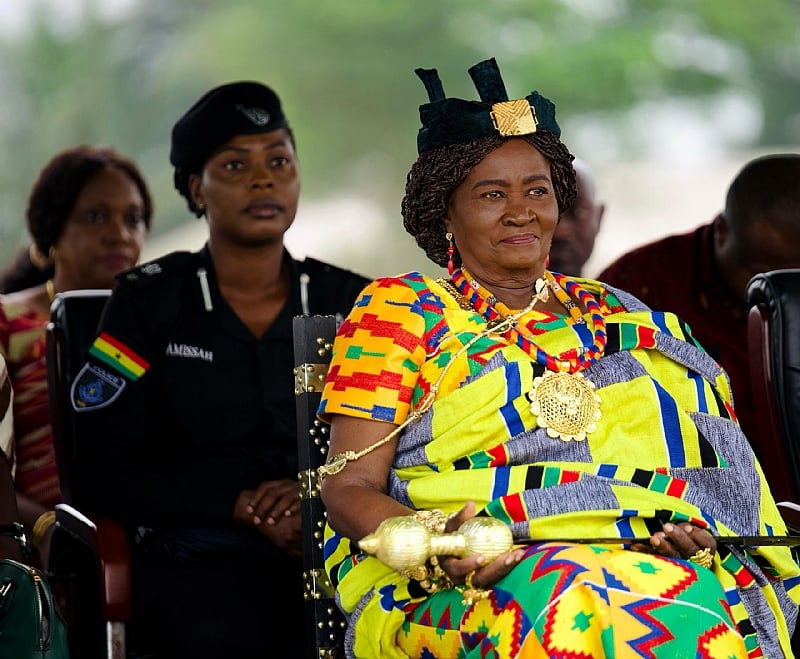The enstoolment of Vice President Professor Naana Jane Opoku-Agyemang as Owoabrempong Kru-Kow I by the Komenda Traditional Area signifies a profound recognition of her distinguished service to Ghana. This esteemed title, bestowed during the vibrant 2025 Komendaman Nyeyi Festival, underscores the community’s deep appreciation for her contributions to education, national development, and her exemplary leadership. The event, steeped in rich cultural tradition, served as a testament to the strong bond between Professor Opoku-Agyemang and the people of Komenda, who embraced her as a true daughter of their land. The ceremony’s vibrancy reflected the joyous spirit of the occasion, with drumming and dancing filling the air as residents celebrated their newly enstooled Owoabrempong.
Professor Opoku-Agyemang’s journey to this significant honor has been marked by a consistent dedication to improving the lives of Ghanaians. Her commitment to education, evident throughout her career as an academic and administrator, has earned her widespread respect. As a former Minister of Education, she spearheaded key initiatives aimed at enhancing access to quality education for all, particularly for marginalized communities. Her focus on inclusive education and her efforts to bridge the gender gap in education have left an indelible mark on the nation’s educational landscape. This unwavering commitment to empowering individuals through education is a cornerstone of her legacy and a central reason for the Komenda Traditional Area’s decision to bestow upon her this prestigious title.
The title of Owoabrempong Kru-Kow I, meaning “brave warrior,” encapsulates the community’s perception of Professor Opoku-Agyemang’s strength, resilience, and unwavering resolve. It acknowledges her ability to navigate complex challenges and her steadfast commitment to pursuing progress and development for all Ghanaians. This title not only celebrates her past achievements but also expresses confidence in her continued leadership and her potential to further contribute to the betterment of the nation. The “Kru-Kow” element, which translates to “unity and togetherness,” further emphasizes her ability to bring people together and foster collaboration towards common goals. It highlights her role as a unifying figure, capable of bridging divides and building consensus across diverse communities.
The enstoolment ceremony itself was a vibrant display of Ghanaian culture and tradition. The colorful attire, the rhythmic drumming, and the energetic dancing all contributed to the festive atmosphere, reflecting the deep-rooted cultural heritage of the Komenda people. The ceremony served as a platform to showcase the rich customs and traditions of the area, while simultaneously celebrating the achievements of a distinguished national leader. The community’s enthusiastic participation underscored the significance of the event and their genuine affection and respect for their newly enstooled Owoabrempong. The joyous celebrations demonstrated the profound impact Professor Opoku-Agyemang has had on the lives of the people and their eagerness to recognize her contributions.
The chiefs of the Komenda Traditional Area, in their commendation of Professor Opoku-Agyemang, highlighted her tireless efforts to improve the quality of life for Ghanaians. They expressed their belief that her enstoolment would strengthen the ties between traditional authorities and the state, fostering greater collaboration and mutual understanding. This strengthened partnership, they believe, will be instrumental in driving progress and ensuring that development initiatives are aligned with the needs and aspirations of the local communities. The chiefs see her as a bridge between the traditional leadership and the modern government, a role they believe she is uniquely suited to fulfill.
The enstoolment of Professor Opoku-Agyemang as Owoabrempong Kru-Kow I represents more than just a symbolic gesture; it is a testament to the power of collaboration and the importance of recognizing exceptional leadership. It signifies the recognition of a leader who has consistently championed education, national development, and the empowerment of communities. The ceremony served as a powerful symbol of unity, bringing together traditional authorities, government representatives, and the local community in a shared celebration of achievement and shared hope for the future. This event serves as an inspiration, showcasing the potential for collaboration and the profound impact individuals can have when they dedicate themselves to the service of others. It underscores the enduring power of tradition and the importance of honoring those who embody the values of service, leadership, and unity.


